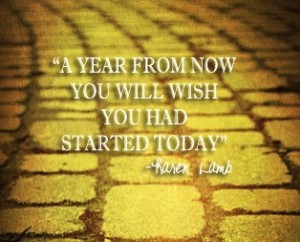New Year’s Resolutions- Good or Bad Idea?
Every January, I get this question from clients:
Do you think I should do [insert goal] as my new year’s resolution?
My response: It depends.
We all know that goals can be a lovely thing. They help us experience our potential, give us the satisfaction of completion, help us grow and evolve, and often provide the opportunity for a really cool experience and to learn just how capable we can be. Focusing on a goal and working towards it not only helps our self esteem, it gives us meaning. And purpose. And meaning and purpose are a HUGE part of what makes us feel like this whole living life thing worthwhile.
You might be excited to go back to school, or run your first 5K or marathon! Perhaps you just want to read more, or get off of social media. Maybe you want to lose weight or make more money.
If someone comes to me with a desire for a goal — my first questions are to explore the WHY. Why do you want to lose weight? Why do you want to go back to school? To me, this exploration of the origin of the desire is paramount to discovering whether or not the goal is actually something that will improve your well being and inner peace. Let’s say your goal is to lose 20 pounds. Your doctor even told you it would be a good idea. Your internal WHY, and how you feel about yourself in relation to what that goal means to you, is not only going to affect your success, it will also affect something deeper- and maybe in not such a good way- something that is much more important than the outcome of the goal itself– your self worth.
The short explanation: Once you attach your self worth to a particular idea about who you should be and what makes you worthy, you become a prisoner to this idea. I’m sure your inner critic would love to argue with me here. But trust me, my clients show up with all different forms of outward success- professionally successful; in amazing shape and health; super organized; super mom capabilities; lots of education, etc. So if you think you’ll be happy, and you’ll be more worthy once you reach X… I hate to tell you this, but those accomplishments are not what make a person happy.
For example, I love to run. It makes me happy. But to set a goal with the idea that if I run 5 days a week I will be a better person, well, that gets a bit tangly. Running makes me happy not because someone else said it’s a good idea and will boost my ego/ sense of worth– but because the actual act of running- especially out there on our beautiful mountain trails, literally is FUN to me. It FEELS good, I can feel stress leaving me, and all kinds of other wonderful cascading consequences because of it. But missing a day of running does not make me a bad person. This might seem obvious saying it like that, but think about the things you think you have to do and be in order to consider yourself worthy of good self esteem.
Stop for a moment and think about a particular goal you have.
Ok, do you have it in your mind? Now, feel for a minute into what that goal feels like. What comes up? Are you excited about it? Does the idea of this experience feel good to you? Like it’s going to add to your life? You feel ready for it? Capable of it? If that’s your feeling response, awesome. However, if when you pause with that goal in your mind, and you feel a sense of urgency, or sadness, or like you NEED this thing, you lack it, and without it you feel bad about yourself, it’s probably a good idea to spend some time first with self compassion. If you have a negative voice in your head telling you “you have to be this, do these things, look this way, etc” in order to be worthy of love and respect, it’s definitely time to put the goal down and address that inner critic first.
A lot of people let their inner critic push them to accomplish things. And most people who do this think they couldn’t accomplish those things without the critic. But I’m going to tell you it’s a big fat lying trick in your head!
I’ll write more about the big fat lying trick of the critic soon, but in the meantime, take a moment for some self reflection on your goals and see if you can identify if they are coming from the negative self judgment voice in your head, or from that place of energy, excited about engaging in the experience of the goal. If you think you’ve got a pretty harsh critic in your head, let’s work together, or find a counselor in your area to get you some relief from that negativity, and in that peace and self compassion you’ll be able to set and reach goals that will add to your life, not define it as the conditions of your worth as a human being.



















Recent Comments